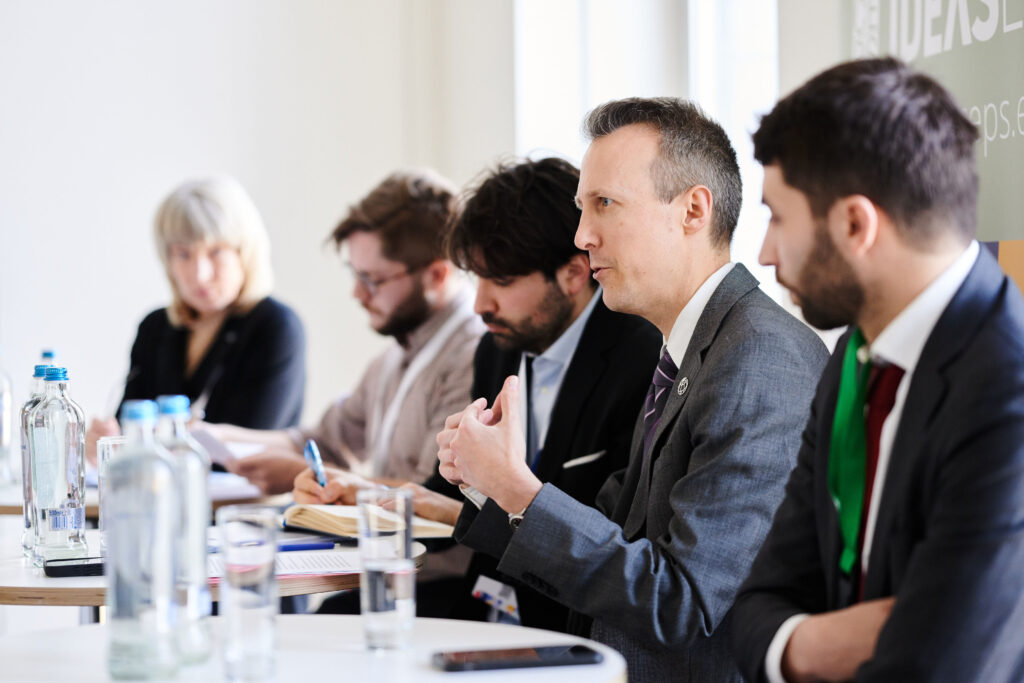On 3-4 March 2025, the Ideas Lab once again provided the opportunity to bring together experts, policymakers, and stakeholders to discuss the pressing European policy issues of the day. This event, held under the auspices of the Centre for European Policy Studies (CEPS) took place this year against the backdrop of rising geopolitical tensions and ensuing challenges, notably on issues of digital sovereignty, energy transition, sustainable trade and the future of work in the age of AI.
One of the panel discussions, titled “Are green jobs great jobs? How to ensure quality jobs in the green transition” focused on the complexities of job quality in emerging green sectors. With the European green transition in full swing, bringing both opportunities and challenges to the labour market, experts from academia and policymaking explored the implications for European workers and the policy measures required to ensure a just transition – all topics which strongly resonated with the aims of the Horizon Europe project TransEuroWorkS, which examines how social protection and employment policies can mitigate the risks associated with structural economic transformations.
The challenge of defining (green) job quality
Job quality is a growing priority in EU policy as it is perceived to be an enabler of both labour market participation and broader socio-economic stability. However, defining what constitutes a ‘good’ (green) job is no simple task. While information on working conditions (including wages), job security, and career prospects provide key indicators for measuring quality, trade-offs exist. As noted by the panel, weighing certain parameters against each other, such as work intensity and autonomy, can be challenging, and ensuring fair wages does not necessarily guarantee adequate job security. In the context of the green transition, job quality concerns become particularly pertinent. On the one hand, newly created occupations tend to require higher skills and offer different working conditions. On the other, already existing jobs important for the transition are often occupied by lower-skilled workers and tend to be of lower quality. .
A key takeaway from the session was that good-quality green jobs cannot be created through regulation alone. The panel argued that while labour protections are crucial, broader industrial policies are also needed to ensure that green sectors offer sustainable and fair employment. Furthermore, subcontracting practices, undeclared work, and weak worker protections were cited as additional factors behind low job quality, in the construction sector in particular . The panel raised the question of whether Germany’s ban on ‘non-core function’ intermediaries could be replicated at the EU level to address these concerns.
Labour mobility and skills gaps in the green economy
One of the most pressing issues highlighted was the difficulty of transitioning from ‘brown’ (high-carbon) to green jobs. Lower-skilled workers in polluting industries are at greater risk of job displacement, yet green jobs tend to demand more complex skill sets. A “green high-skill premium” was noted, with workers in green jobs earning approximately 5% more than their equally skilled counterparts in non-green occupations. Moreover, this transition is not evenly distributed across demographic groups. The discussion revealed that the green transition is largely a ‘male transition’, as 80% of jobs held by women will remain largely unchanged.
What remained clear is that labour shortages, particularly driven by demographic change, are expected to be a major structural challenge for the EU. Given this state of affairs, the panel underscored the need for increased labour mobility within and beyond the EU, both to address skills gaps and to sustain the workforce needed for the green transition. A central policy challenge will be ensuring that green jobs are attractive enough to encourage worker mobility without resorting to deregulation.
Green Transition and TransEuroWorkS
All in all, the session’s insights align closely with TransEuroWorkS’ research agenda, which examines the impact of digitalisation, automation, and the green transition on labour markets and social protection. The project’s focus on labour mobility, retraining policies, and inclusive social protection measures addresses many of the challenges raised in the discussion.
Notably, the panel reinforced the need for “upstream” interventions—policy actions that pre-emptively support workers before they experience unemployment shocks. This includes proactive reskilling programmes, financial incentives for transitioning workers, and enhanced occupational health and safety measures to mitigate climate-related workplace risks such as heat stress and extreme weather, matching the project’s priorities. Moreover, the discussion echoed TransEuroWorkS’ emphasis on understanding regional and sectoral asymmetries in the green transition, ensuring that policies are tailored to the specific needs of different workforce segments.
The road ahead
The green transition is reshaping Europe’s labour market and ensuring that new green jobs meet high-quality standards will require coordinated action from policymakers, businesses, and social partners. The TransEuroWorkS project will continue to contribute to this debate by producing policy-relevant research that informs strategies for a fair and sustainable transition.
As Europe moves forward with its ambitious climate goals, the insights from CEPS Ideas Lab 2025 reaffirm the importance of an inclusive and equitable approach to green job creation. By combining regulatory safeguards with industrial policy, skills development, and social protection reforms, the EU can ensure that the jobs of tomorrow provide stability, security, and fair compensation for all workers.

